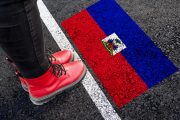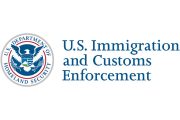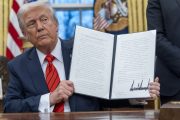
Judge Derrick K. Watson of the Federal District Court in Honolulu — who was one of two judges who issued a ruling last March blocking sections of President Trump’s March 6 executive order that banned travel to the United States by foreign nationals from six countries identified as being state sponsors of terrorism — is at it again. On July 13, Watson imposed his own interpretation of the Supreme Court’s June 26 ruling that allowed the travel ban to go into effect, exempting only one category of foreigners from the travel ban, those “with a credible claim of a bona fide relationship with a person or entity in the United States.”
However, the court left “bona fide relationship” open to interpretation. The Trump administration interpreted that exemption as applying only to immediate family members such as a parent, spouse, fiancé, son, daughter, son-in-law, daughter-in-law, or sibling. However, in his latest ruling, Watson decided to expand the exemption considerably, to include grandparents, grandchildren, brothers-in-law, sisters-in-law, aunts, uncles, nieces, nephews, and cousins of people already in this country.
In his ruling, Watson touted the superiority of his own definition above that of the Trump administration, asserting: “The Government’s definition represents the antithesis of common sense. Common sense, for instance, dictates that close family members be defined to include grandparents. Indeed, grandparents are the epitome of close family members. The Government’s definition excludes them. That simply cannot be.” (Emphasis in original.)
Hawaii’s Attorney General Douglas Chin issued a statement about Watson’s ruling: “The federal court today makes clear that the U.S. Government may not ignore the scope of the partial travel ban as it sees fit. Family members have been separated and real people have suffered enough. Courts have found that this Executive Order has no basis in stopping terrorism and is just a pretext for illegal and unconstitutional discrimination. We will continue preparing for arguments before the U.S. Supreme Court in October.”
This was Watson’s second ruling aimed at the Trump travel ban. Last March, just hours before an amended version of the ban was scheduled to take effect, he granted a temporary restraining order enjoining the Trump administration executive branch from enforcing or implementing two key sections of the March 6 executive order across the nation.
The New York Times reported Watson’s written statement at the time asserting that a “reasonable, objective observer” would view even the new order as “issued with a purpose to disfavor a particular religion, in spite of its stated, religiously neutral purpose.”
Trump’s March 6 order that Watson stopped had dropped some language that had been included in the original January 27 travel ban order — language that made exceptions for persecuted religious minorities, including Christians. This well-intentioned item was misconstrued by critics (including a Seattle judge who ruled against it on February 3) as being “anti-Muslim,” so it was removed from the second order.
Despite this change, both Watson and U.S. District Judge Theodore D. Chuang in Maryland (who were both appointed by former president Obama) made numerous reference to Trump’s alleged anti-Muslim bias in their respective decisions to block the order.
The administration appealed these judges’ decisions to the Supreme Court, which as mentioned previously, granted most of the administration’s emergency request to put the travel ban into place.
During a press gaggle aboard Air Force One on July 14 conducted by Homeland Security Advisor Tom Bossert, a reporter asked if the administration had any response to Watson’s ruling and if it raised any concerns as far as security enforcement.
Bossert replied that he did not know of any formal administration response, and although he had not read the entire ruling, he did have concerns based on early reports. He said:
So I would say that, as it was reported to me, it seemed to be fairly broad and something that would trouble me if it was as broad as reported. In terms of a connection with any group, any refugee organization, it might be read, if the early reports that I looked at were accurate, as something so expansive as to cover every refugee. And that certainly couldn’t be the interpretation the Supreme Court intended.
When the report asked Bossert if there had been steps taken to design and implement extreme vetting procedures for admitting aliens, he answered:
There’s a number of efforts ongoing to implement the president’s executive order, especially now that it is been freed from legal constraint by the Supreme Court. The question you asked is about vetting. Of course, we’re improving … our policies and our capabilities to better vet people seeking entry into the United States.
Image of court: Screenshot of District Court of Hawaii website
Related articles:
Supreme Court Allows Most of Trump Travel Ban to Proceed, Will Hear Case in Fall
Ninth Circuit Court Rules Against Travel Ban, but Trump Fires Back
Trump’s DOJ Submitted “Watered Down” Version of His Travel Ban to Supreme Court
Trump Administration Asks SCOTUS to Rule on “Travel Ban”
9th Circuit Court Considers Appeal of Judge’s Order Against Trump Travel Ban
Federal Judge Upholds Trump Travel Ban Blocked by Other Courts
Federal Judges Again Block Trump Travel Ban From Nations With Terrorist Ties
Trump Signs New Immigration Executive Order
Judge Grants Stay to Bar Trump DHS From Deporting Aliens From Seven Nations of Concern
Trump’s Order Suspending Refugee Program: Racism or Balanced National Security?
Trump Executive Order to Ban Nationals of “Countries of Particular Concern”




